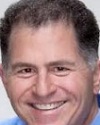
Dell began as a consumer PC business, still the most visible part of the company—but now that is less significant than the primary focus on business, education and government services. Outsiders see Dell as an inexpensive online retailer of PCs. The company shifted its focus from that to services over a fifteen year period. Forty percent of Dell employees are now devoted to services and the company is the number one provider, world wide, of health care IT systems. Over half of U.S. physicians use Dell systems for medical records, evidence-based medicine, and cloud archives (4.5 billion images). Organizational silos in health care present the current big challenge. Health care IT is currently similar to where general IT was thirty years ago. Breaking down silos in hospitals, doctors' practices and care-giving organizations is one of Dell's goals.
The company is frequently portrayed as a competitor with HP, Facebook and Apple—that is annoying to Michael Dell. These companies, like Dell, have similar goals to deal with customer concerns about changing business and technological environment. One approach by Dell has been the PartnerDirect program that currently includes a hundred thousand participants. Dell also has a strong presence in web operating systems and client devices (mobile equipment, telephones, sensors, tablets).
Rather than compete, Dell works with such companies as Tencent.com, a customer-oriented company in China. Tencent has 650 million users in China, mostly cellphones. Dell provides infrastructure for major companies helping customers deal with the explosion of devices, some ten billion of them. They are doing this for eBay, Twitter, Adobe, Microsoft, Facebook and SalesForce.com. Dell did produce the Streak tablet, but recognizes the iPad is the current dominant tablet. However, Android and Microsoft are recognized challengers.
Michael is a Twitter and Google Plus user, unusual for a large company CEO. The reason goes back to his childhood where he set up a bulletin board system after he dismantled his first Apple II. Even then he saw the power of sharing. That's why Dell is now known as a company with 'big ears'. He sees media as a fantastic way to collaborate, share knowledge and learn faster on a greater scale. The company has turned its social media command center into a service and shown other companies how to develop their own, similar to what Radian6 tools do for social media listening, monitoring and engagement.
Advice for beginners: experiment, be willing to fail, be able to scale (grow rapidly). Dell once had to grow from $800 million in revenue to over two billion in one year. It was difficult, but the company succeeded. While it's a gamble, Mike says, "Go big or go home!"
Michael Dell is the chairman of the board of directors and chief executive officer of Dell, the company he founded with $1000 in 1984 at age 19. In 1992, Michael became the youngest CEO ever to earn a ranking on the Fortune 500. Today, Dell Inc. is comprised of more than 100,000 team members who serve the IT needs of global corporations, small businesses, governments, healthcare providers, education institutions and home computing users. From PCs and smartphones to the infrastructure and services that power the world’s most complex data centers and cloud computing environments, In 1998, Michael formed MSD Capital and in 1999 he and his wife established the Michael & Susan Dell Foundation to provide philanthropic support to a variety of global causes. Michael serves on the Foundation Board of the World Economic Forum, the executive committee of the International Business Council and is a member of the U.S. Business Council. He also serves on the Technology CEO Council and the governing board of the Indian School of Business in Hyderabad, India and is a board member of Catalyst.
Resources
This free podcast is from our Web 2.0 Conference series.
For The Conversations Network:
Photo: Google Plus